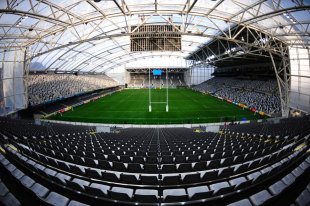|
Comment
Provincial rugby has no future
Huw Turner
March 19, 2012

Otago may have a hi-tech stadium but does provincial rugby in the region have a future?
© Getty Images
Enlarge
The financial crisis which recently bankrupted the Otago Rugby Union came as no surprise to those of us who have been watching and reporting on the decline of provincial rugby in New Zealand over the past decade. The bailout package put together by the union's creditors, the Dunedin City Council and the New Zealand Rugby Union buys time and enables Otago to continue to participate in the ITM Cup, the old and much-lamented NPC. However, in the mid to long term it guarantees nothing and in the next few months we are likely to witness other struggling unions going to the financial wall. To put it bluntly, provincial rugby in New Zealand has no future, is doomed, is finished. This was always going to be the logical outcome of the decision to openly professionalise rugby following the 1995 World Cup in South Africa. Whilst that decision was inevitable, and whilst the available alternatives would still have seen the likes of the Otago Rugby Union staring at oblivion at some stage, we can now begin to see in sharper focus the consequences for the grassroots game of its global professionalization. It also comes as no surprise that the other corner of the rugby world where professionalism is wreaking havoc with the symbiotic relationship between communities and the game is Wales. Both in New Zealand and in Wales the game of rugby grew and gathered its strength from working class villages and towns. It also represents each country's premier sporting activity, the one with which most people in the community identify and around which they unite. The 2011 World Cup in New Zealand reminded us all how embedded in each and every community the game is. Unfortunately, the game's strength in both New Zealand and Wales is also its biggest weakness. Any history of the game places the exploits of All Blacks and Welsh teams at its very centre. Yet at a time when the game is driven by money, and very little else, then the power brokers exist and operate well away from the game's spiritual heartlands. And they have no respect for, understanding of and interest in the traditions upon which the game developed. Clubs have been replaced by regions and franchises. Fixtures are scheduled to suit broadcasters, not players or spectators. The game in the southern hemisphere is effectively owned by satellite television companies and their public relations consultants have inflicted on us ridiculous team names like the Highlanders and the Crusaders. When did a crusade ever pass through Canterbury in the South Island of New Zealand?
Young New Zealand players no longer necessarily learn the game in their own country's competitions. Strength in depth is eroded because in a professional sport players have to assess where they can best maximize their earning potential. It is worth the while of All Black contenders to stick around and establish whether or not they can fulfil that part of their rugby dream. But those who will never make the All Blacks, who are perfectly good players and would have graced the National Provincial Championship and contributed to the strength of the game in New Zealand, are leaving in their droves. To play for Connacht, or the Ospreys, or Viadana or Sony. Which brings us back to Otago. The very run down nature of Carisbrook in Dunedin symbolized the provincial game. Not just in the deep south but throughout New Zealand. A clapped-out stadium where teams which no longer field the country's very best players huff and puff in front of pitifully small audiences. The action is elsewhere, in Bloemfontein, or Brisbane, or Hamilton. Except that in the case of New Zealand nobody really cares about or identifies with the franchises. The traditional strength of the game in Otago is reflected in the selection of Dunedin as one of the original bases for Super Rugby. Down the years All Black teams have been graced by healthy representation from the men of Otago : Chris Laidlaw, Jamie Joseph, Arran Pene, Jeff Wilson, Byron Kelleher, Taine Randell, Josh Kronfeld, just to name a few of the most obvious ones. They played a vibrant form of the game, powerful up front, fluent and skilful amongst the backs, more than a match for any of the major touring teams. As we got further into the professional era resources and attention went to the franchise, the Highlanders, at the expense of the indigenous rugby union. Central contracting and the drafting of players conspired in a vicious circle to weaken the ties between clubs, the union and the professional game. As the latter became more and more an elite activity provincial unions like Otago realized they were being squeezed from all sides, their basic reason for existence, the provision and maintenance of community rugby, no longer tenable. The disappearance of the Otago Rugby Union would have meant the disappearance of rugby in the lower half of the South Island of New Zealand. This is a terrifying thought, but this is what is at stake. This is what professional rugby has done. © ESPN Sports Media Ltd.
| |||||||||||||||
Live Sports
Communication error please reload the page.
-
Football
-
Cricket
-
Rugby
-
- Days
- Hrs
- Mins
- Secs
F1 - Abu Dhabi GP
Abu Dhabi Grand Prix December 11-131. Max Verstappen ()
2. Valtteri Bottas (Mercedes)
3. Lewis Hamilton (Mercedes)
4. Alexander Albon ()
5. Lando Norris ()
6. Carlos Sainz Jr ()
-
ESPNOtherLive >>
Boxing - Nelson v Wilson; Simmons v Dickinson; Joshua v Gavern (Metro Radio Arena, Newcastle)
Golf - Houston Open
Snooker - China Open
Tennis - Miami Open

